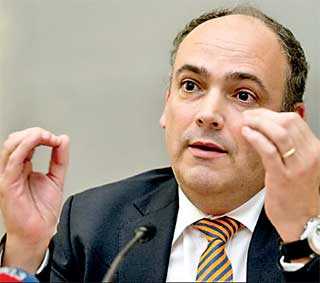Friday Feb 27, 2026
Friday Feb 27, 2026
Monday, 11 March 2019 00:00 - - {{hitsCtrl.values.hits}}
ShippingWatch: Billions of dollars in additional costs related to the more expensive low-sulphur fuel, which is waiting less than 10 months down the road, will end up on the shippers’ desk.
At least in terms of Maersk and Hapag-Lloyd’s customers, the two liner majors’ chief executives tell ShippingWatch.
 |
Maersk CEO Søren Skou |
 |
Hapag-Lloyd CEO Rolf Habben Jansen |
“As for the contracts, we’re getting the clauses we want included in the contracts,” says Maersk CEO Søren Skou in an interview with ShippingWatch.
The message is the same from Hapag-Lloyd CEO Rolf Habben Jansen.
“On the routes where most negotiations have been concluded, we’re seeing a majority of our customers accepting the new formula,” Habben Jansen tells ShippingWatch. “As for the contracts, we’re getting the clauses we want included in the contracts.”
The two CEOs of the world’s largest and fifth-largest shipping line, respectively, are currently in Long Beach, California to participate in the two-sided negotiations taking place at the TPM conference.
The conference is described as one of the most important events in terms of securing contracts with shippers on the Pacific routes, but also in terms of settling contracts generally.
And this year there is even more at stake than usual.
Less than 10 months from now, all ships in the global fleet will have to comply with the IMO’s global sulphur regulations. Some shipping companies plan to use scrubbers to ensure compliance, but the vast majority of the global fleet will still have to sail on low-sulphur fuel.
However, the new fuel is significantly more expensive, and shipping lines have said that they will send the added costs – which many stakeholders estimate will reach $ 10-15 billion for the sector overall – on to the customers.
For Maersk, the extra costs could total $ 2 billion, the company has previously estimated.
Higher rates at Maersk
Søren Skou and Maersk hosted a major customer event, and when ShippingWatch meets him, he has five or six meetings with customers to get to.
According to Skou, Maersk has been able to secure contracts with shippers which include the new bunker adjustment factor, BAF.
Close to half of Maersk’s Ocean business is tied up on contracts, while the other half is done in the spot market.
“If it ends up being that figure [$ 2 billion, -ed.], then half will be contracts, so we’re certain to have that covered. Then it becomes a matter of what happens in the spot market. Here I’ll note the fact that the balance between supply and demand looks fairly solid this year and next year,” says Skou, adding that his experience from the talks with shippers is that they understand the necessity of passing the costs on.
“If it [the extra costs related to low-sulphur fuel, -ed.] just go to the shipping companies and ends there, it would result in bankruptcies,” he says.
“On the routes where most negotiations have been concluded, we’re seeing a majority of our customers accepting the new formula.”
Furthermore, the company has, according to Skou, been able to sign at higher rates.
“I’m sure the contract rates will go up this year,” he says. “At all talks here at TPM about Transpacific freight rates, we’re talking higher prices. So the question is by how much.”
A major shipper ShippingWatch has spoken to confirms that Maersk has achieved higher rates.
No worries about new fuels
At Hapag-Lloyd, CEO Habben Jansen declines to go into detail about how many of the shippers have accepted the new fuel surcharge. But he says that it concerns a “very large percentage”.
He explains that this involves Hapag-Lloyd’s own new BAF, but also the shippers’ own. The availability of the new low-sulphur fuels, which Hapag-Lloyd and others will use, does not worry the German shipping line’s CEO. “There are always concerns, but we tank most of our fuel in the biggest bunkering ports, and we don’t expect that availability will be a challenge,” says Habben Jansen. Even though the shipping line has not yet been able to test the new low-sulphur fuel oils, there are no concerns about quality, he adds.